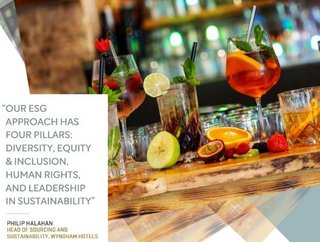Wyndham Hotels - strategic sourcing for 9,000 properties

Strategic sourcing is a process designed to ensure that organisations purchase the best products or services for the best value and that will best meet customer or client needs. Increasingly, it’s a strategy to which businesses are turning to keep them on course with their net-zero journeys.
It’s an important undertaking for any chief procurement officer, but in today’s world of turmoil and uncertainty, strategic sourcing takes on even more importance. It can be the difference between feeling the full brunt of supply disruption or successfully navigating your way through it. On ESG requirements, it can also be the difference between compliance and non-compliance.
Philip Halahan is Head of Sourcing and Sustainability at Wyndham Hotels and Resorts, which has 9,000 properties worldwide and owns a total of 22 brands. He knows all too well the criticality of strategic sourcing.
Responsible for the design and delivery of Wyndham’s regional sourcing strategy, which focuses on delivering a cost-effective yet sustainable, ethical supply chain for hotels across the EMEA region, he is also responsible for the company’s sustainability strategy.
At the most recent Procurement & Supply Chain LIVE event, in April of this year, Halahan shared insights into his role with a live and remote audience, fielding questions both from BizClik Media’s Director of Content, Scott Birch, and also attendees – many of whom were also procurement professionals. The following is an edited version of this.
What impact has Covid had on sustainability goals?
The past few years have been incredibly challenging for the hospitality industry, but it doesn’t matter whether you’re a hotelier, a transport provider, or in the extended supply chain – sustainability is key. The pandemic was a catalyst for change and it focused people's minds on sustainability.
The EMEA region is huge. What are its supply challenges?
From a supply chain perspective, it presents a huge challenge for everybody. We have to source the right goods and services for our different regions, all of which have their own requirements and specialisations. And we have to source in a way that is not only valuable to our hotels but that also fits the needs of the regions they operate in.
What are Wyndham’s sustainability priorities?
Our ESG approach has four pillars: diversity, equity & inclusion, human rights, and leadership in sustainability. The Wyndham Green Programme has been rolled out across the globe, and it can take a hotel from doing nothing on sustainability through to making all aspects of their operation and extended supply chain sustainable in the way they procure food, goods and services.
Consumers are really interested in staying in sustainable accommodation. And it’s a big selling point for hotels. Also, from a management perspective, operating sustainably can improve your bottom line, just by making small investments in energy efficient light bulbs, for example. It's a sustainable change that can be made enterprise wide.
What role can procurement play in recycling?
One challenge when engaging hotels to participate in recycling programmes is the lack of recycling facilities available in certain countries. Governments really should enable basic recycling for any hospitality business.
But if, like us, you’re a hotel company with five or six properties within a city, you can pull them together and create the demand locally for recycling, speaking to the local government to create such a service in that area. This way, it’s possible to unlock the benefits of having good sustainability schemes in place.
With all the travel, can hospitality ever be sustainable?
People travel. Hotels don't; they are where they are, and they’re important for society as they provide employment while also bringing something to the environment in which they're situated.
But it’s important that hotels set an example. One of the things we’re looking at, certainly from a procurement and sustainability perspective, is the availability of EV charging points at our properties.
So, if one of our properties is in a drive-to location – which many of ours are – the availability of EV charging is something we think is important to offer. We're future-proofing in anticipation of electric vehicles. It's about ensuring the choices travellers make take into account the environmental cost their journey might have.
One sustainability measure every firm should follow?
Simple – measuring what your impact is. For me, it’s all about being able to baseline. If you don't know what your impact is now, how on earth can you credibly set a target for carbon reduction?
One thing we ensure is that our properties can baseline what their energy consumption is, and the simplest way to do this is at a property level on a month-by-month basis. How much fuel am I using to heat or cool the building? How much electricity and gas am I using? Those are the questions that need asking, and then you baseline that over six months and see what it's telling you.
Then, of course, in hospitality you have seasonality, and you can set yourself sustainability targets around this. Things such as ‘I want to reduce hourly electricity consumption by X%’. Then you create a plan as to how this can be achieved. By turning lights off? By sourcing energy-efficient bulbs? Should you source and install motion sensors to automate light use? Then when you’ve done one or all of these things, you measure the improvement on your consumption.
This is why we're encouraging our properties to start that process now, because the more data they have, the better able they are to baseline what they’re using and then set strategies in place to reduce consumption.
The travel industry generally needs to adapt and it needs to change. Tackling that change head-on will be key. It's very much a case of understanding what you're doing now, and then putting in place strategies that can help you become more sustainable in the future.






